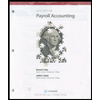Problem 1DQ: When is revenue recognized? Problem 2DQ: When is a performance obligation satisfied? Problem 3DQ: At what amount should sales revenue be recorded when sales discounts are present? Problem 4DQ Problem 5DQ Problem 6DQ Problem 7DQ Problem 8DQ Problem 9DQ Problem 10DQ: Why is the direct write-off method not GAAP? Problem 11DQ Problem 12DQ Problem 13DQ Problem 14DQ: How much interest will be due at maturity for each of the following interest-bearing notes? Problem 15DQ: A business borrows $1,000, signing a note that requires repayment of the amount borrowed in two... Problem 16DQ Problem 17DQ: Describe what happens when receivables are factored. Problem 18DQ Problem 19DQ Problem 20DQ Problem 21DQ Problem 22DQ: How may analyzing sales and receivables provide information about a firms profitability? Problem 23DQ Problem 1MCQ Problem 2MCQ: When is revenue from the sale of merchandise normally recognized? a. When the customer takes... Problem 3MCQ: What does the phrase, Revenue is recognized at the point of sale mean? a. Revenue is recorded in the... Problem 4MCQ Problem 5MCQ Problem 6MCQ Problem 7MCQ Problem 8MCQ: All of the following are ways in which receivables are commonly distinguished except a. collectible... Problem 9MCQ: Which one of the following best describes the allowance for doubtful accounts? a. Cash flow account... Problem 10MCQ: If a company uses the direct write-off method of accounting for bad debts, a. it will report... Problem 11MCQ Problem 12MCQ: Which of the following best describes the concept of the aging method of receivables? a. An accurate... Problem 13MCQ: The aging method is closely related to the a. income statement. b. balance sheet. c. statement of... Problem 14MCQ Problem 15MCQ Problem 16MCQ Problem 17MCQ: Zenephia Corp. accepted a 9-month note receivable from a customer on October 1, 2019. If Zenephia... Problem 18MCQ Problem 19MCQ Problem 20MCQ: ( Appendix 5A) Under the gross method, the seller records discounts taken by the buyer a. at the... Problem 21CE: Service Revenue Kibitz Fitness received S30000 from customers on August l, 2019. These payments were... Problem 22CE: Service Revenue Softball Magazine Company received advance payments of $75,000 from customers during... Problem 23CE Problem 24CE Problem 25CE: Percentage of Credit Sales Clarissa Company has credit sales of $550,000 during 2019 and estimates... Problem 26CE: Write-Off of Uncollectible Accounts The Rock has credit sales of $425 000 during 2019 and estimates... Problem 27CE: Aging Method On January 1, 2019, Hungryman Inc. has the following balances for accounts receivable... Problem 28CE: Aging Method On January 1, 2019, Smith Inc. has the following balances for accounts receivable and... Problem 29CE Problem 30CE Problem 31CE: Accounts Receivable Balance Beginning accounts receivable were $275,500, and ending accounts... Problem 32CE: Accounts Receivable Balance Beginning accounts receivable were $80,200, and ending accounts... Problem 33CE Problem 34CE: Notes Receivable Metzler Communications designs and programs a website for a local business. Metzler... Problem 35CE: Notes Receivable Link Communications programs voicemail systems for businesses. For a recent... Problem 36CE: Ratio Analysis The following information pertains to Cobb Corporations financial results for the... Problem 37CE: Ratio Analysis Diviney Corporations net sales and average net trade accounts receivable were... Problem 38CE Problem 39BE: Service Revenue H**R Wholesalers is a retailer providing low cost, bulk items to small companies.... Problem 40BE: Service Revenue Melrose Milk Delivery provides weekly gourmet milk delivery to the residents of... Problem 41BE Problem 42BE Problem 43BE Problem 44BE: Write-Off of Uncollectible Accounts King Enterprises had 27 customers utilizing its financial... Problem 45BE: Aging Method Spotted Singer sells karaoke machines to businesses and consumers via the Internet. On... Problem 46BE: Aging Method Ingrid Inc. has strict credit policies and only extends credit to customers with... Problem 47BE: Percentage of Credit Sales Method Ruby Red manufactures, markets, and distributes citrus flavored... Problem 48BE: Collection of Amounts Previously Written Off Hannah purchased a laptop computer from Perry Corp. for... Problem 49BE: Accounts Receivable Balance Hart Inc. began the year with $315,700 of accounts receivable. During... Problem 50BE: Accounts Receivable Balance XYZ Corp sells widgets to consumers for $20 each. Its beginning accounts... Problem 51BE: Accounts Receivable Balance Rays beginning and ending accounts receivables balances are $147,990 and... Problem 52BE Problem 53BE Problem 54BE Problem 55BE: Ratio Analysis Dobbys income statement lists net sales of $179,000 and a gross margin of $111,000.... Problem 56BE: Ratio Analysis Rose Corporation sells upscale lamps to boutiques across the country. The average net... Problem 57BE Problem 58BE: ( Appendix 5A) Sales Discounts Harry Gardner provides tax services for small businesses. This years... Problem 59BE: ( Appendix 5A) Sales Discounts Ramsden Inc. provided consulting services with a gross price of... Problem 60E: Calculation of Revenue Wallace Motors buys and sells used cars. Wallace made the following sales... Problem 61E Problem 62E: Calculation of Revenue from Cash Collection Anderson Lawn Service provides mowing, weed control, and... Problem 63E Problem 64E: Sales and Sales Returns and Allowances Rubin Enterprises had the following sales-related... Problem 65E: Average Uncollectible Account Losses and Bad Debt Expense The accountant for Porile Company prepared... Problem 66E: Bad Debt Expense: Percentage of Credit Sales Method Gilmore Electronics had the following data for a... Problem 67E Problem 68E: Bad Debt Expense: Aging Method Glencoe Supply had the following accounts receivable aging schedule... Problem 69E: Aging Receivables and Bad Debt Expense Perkinson Corporation sells paper products to a large number... Problem 70E: Allowance for Doubtful Accounts At the beginning of the year, Kullerud Manufacturing had a credit... Problem 71E: Collection of Amounts Previously Written Off Customer Rob Hufnagel owes Kellman Corp. $1,250.... Problem 72E Problem 73E: Accounting for Notes Receivable On November 30, 2019, Tucker Products performed computer programming... Problem 74E: Recording Notes Receivable: Issuance, Payment, and Default Marydale Products permits its customers... Problem 75E Problem 76E: Ratio Analysis The following information was taken from Nash Inc.s trial balances as of December 31,... Problem 77E: Ratio Analysis The following information was taken from Logsden Manufacturings trial balances as of... Problem 78E Problem 79APSA Problem 80APSA Problem 81APSA Problem 82APSA Problem 83APSA: Bad Debt Expense: Percentage of Credit Sales Method The Glass House, a glass and china store, sells... Problem 84APSA: Aging Method Bad Debt Expense Cindy Bagnal, the manager of Cayce Printing Service, has provided the... Problem 85APSA: Determining Bad Debt Expense Using the Aging Method At the beginning of the year, Tennyson Auto... Problem 86APSA: Accounting for Notes Receivable Yarnell Electronics sells computer systems to small businesses.... Problem 87APSA Problem 88APSA Problem 79BPSB Problem 80BPSB Problem 81BPSB Problem 82BPSB Problem 83BPSB Problem 84BPSB: Aging Method Bad Debt Expense Carol Simon, the manager of Handy Plumbing has provided the following... Problem 85BPSB: Determining Bad Debt Expense Using the Aging Method At the beginning of the year, Lennon Electronics... Problem 86BPSB Problem 87BPSB Problem 88BPSB Problem 89.1C: Ethics and Revenue Recognition Alan Spalding is CEO of a large appliance wholesaler. Alan is under... Problem 89.2C Problem 89.3C Problem 90.1C Problem 90.2C Problem 90.3C Problem 91C Problem 92.1C Problem 92.2C Problem 93.1C Problem 93.2C Problem 94.1C Problem 94.2C Problem 95.1C Problem 95.2C Problem 95.3C Problem 95.4C Problem 95.5C Problem 95.6C Problem 95.7C Problem 96.1C: Comparative Analysis: Under Armour, Inc., versus Columbia Sportswear Refer to the 10-K reports of... Problem 96.2C Problem 96.3C Problem 96.4C Problem 96.5C Problem 96.6C Problem 97.1C Problem 97.2C format_list_bulleted


 Cornerstones of Financial AccountingAccountingISBN:9781337690881Author:Jay Rich, Jeff JonesPublisher:Cengage LearningPrinciples of Accounting Volume 1AccountingISBN:9781947172685Author:OpenStaxPublisher:OpenStax College
Cornerstones of Financial AccountingAccountingISBN:9781337690881Author:Jay Rich, Jeff JonesPublisher:Cengage LearningPrinciples of Accounting Volume 1AccountingISBN:9781947172685Author:OpenStaxPublisher:OpenStax College Intermediate Accounting: Reporting And AnalysisAccountingISBN:9781337788281Author:James M. Wahlen, Jefferson P. Jones, Donald PagachPublisher:Cengage Learning
Intermediate Accounting: Reporting And AnalysisAccountingISBN:9781337788281Author:James M. Wahlen, Jefferson P. Jones, Donald PagachPublisher:Cengage Learning





